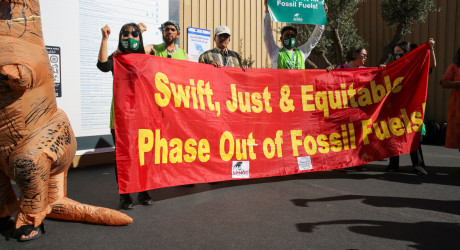PUBLIC FINANCE
Governments are still spending billions subsidizing oil, gas and coal. We need to #StopFundingFossils and start investing in the future.
OVERVIEW OF WORK
Since the Paris Agreement, G20 governments have continued to finance more than USD 77 billion dollars annually in fossil fuels through multilateral development banks (MDBs), bilateral development finance institutions (DFIs), and export credit agencies (ECAs). This is three times the support they provide to clean energy. Beyond providing this direct monetary backing, these institutions reduce perceived risk and provide a government stamp of approval on fossil fuel projects that often serves to crowd in private finance. While recently the level of fossil fuel support has started to drop, institutional policies to exclude fossil fuel finance are needed to ensure this progress continues.
While a number of public finance institutions committed to ending coal finance in the early 2010s, it wasn’t until 2017, following years of campaign pressure by Oil Change and others, that the World Bank made a meaningful commitment to stop financing for upstream oil and gas. Following an intense campaign effort, in 2019 the European Investment Bank committed to ending nearly all oil, gas and coal finance. Recently, the UK announced it would end overseas oil and gas finance, and the EU and US, among others, have signalled that they intend to follow suit. Building off these successes, OCI is now working to secure further commitments from governments and public finance institutions on ending public finance for fossil fuels.
LATEST PROGRAM POSTS
“Today's commitment to make a finance roadmap to limit warming to 1.5°C and ensure a just energy transition is a welcome step, but in order to be useful, the IEA's new research must continue with strong recommendations to immediately halt finance flowing to fossil fuels, and start recommending dramatically increased public finance on fair terms for renewable energy and energy efficiency."
"Today’s announcement from the Netherlands, United Kingdom, Canada and many of their peers is a disappointment. At a time when we need rich country leaders to concretely expand their past ambition to secure a fair deal, these ministers are just regurgitating promises and initiatives that are now more than a decade old and have been so ineffective that fossil fuel handouts and profits continue to reach record levels."
Australia has joined a major international initiative to end international public finance for fossil fuels at an event held at the UK Government Pavilion today at COP28. Australia follows Norway, who also joined the initiative on Saturday.
Today 222 civil society groups from 55 countries sent an open letter calling on world leaders to transform international public finance to tackle climate change and deliver a just energy transition.
LATEST PROGRAM RESEARCH
The twin challenges of air pollution and climate change demand a rapid transition away from fossil fuels, and a particularly rapid phase-out of coal-fired power plants. Despite this, the Korean government continues to be among the biggest backers of coal-fired power plants around the world.
A new analysis of the energy finance provided by the African Development Bank (AfDB) shows that while financing for clean energy access has increased since the bank's landmark New Deal on Energy for Africa, support for off-grid and mini-grid solutions — often the fastest and most affordable energy access solutions — must accelerate if Africa is to realize universal energy access by 2030.
Overall, the MDBs are not financing energy access at nearly a sufficient level to meet the needs of energy-poor communities. Much of the energy access finance that is being provided is being directed to many of the communities that need it most. But even so, energy access is not reflected as a priority for the MDBs.



